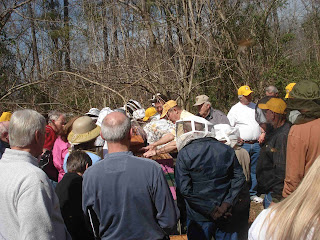It was in the 70s and up to 80 on sunday, which is just exactly what we need around here. "We" being beekeepers, in this particular formulation. The nectar is flowing and all of my hives are looking just as they should at this point in the early spring.
The timing of the good weather was especially perfect since the Tidewater Beekeepers Association and the VWC Beekeeping Association put on beekeeping short course over at the campus. I didn't do the planning this year aside from arranging the facility, but I did give a presentation oj the history of beekeeping and hive management and talk people through the VWC hives. And there were a lot of people-- 70 showed up to learn how to keep bees, which is a huge number. It is almost enough to give you faith in the future.
That many people crowded around the hives made it basically impossible to get a picture that was worth a damn, but these give you the idea of the scene out there. I am supposed to get other people's pictures and will post them when I do.
I was really glad to see that most people exhibited zero fears of the bees. The spring is the best time to introduce people into the hives--the bees are gentle, they are all thoroughly stoked to be out gathering nectar, the promise of the year is all laid out right in front of you.


That is C.E. Harris in the middle, one of the master beekeepers in this whole area.



That guy explaining about the frame of bees in the middle of the last picture is Bob Schwartz. Here Bob clipped the wings of a swarm queen: (you clip the wings to minimize swarming. Best to practice on drones...) I like this picture because of the one hovering worker over on the left.

I have learned a lot from Bob over the years, he is one of the local guys who has been in the bees for decades hand has experience coupled with hundreds of hours of observation. I got started keeping bees with his advice, along with that of another guy I won't name here so I can tell you his technique of teaching beekeeping--first you showed up at his place in rural Virginia Beach on a warm morning by 10 am. Then you poured yourself a large glass of scotch. Then you went in the hives. Refresh glass. Repeat. Building muscle memory in the service of the bees, or something like that. It is this kind of handcrafted beekeeping that gets lost in the current generation.
Beekeepers are uniformly an eccentric bunch. (That might really surprise you). One of the things that I like about beekeepers is that unlike academics or musicians (my two other circles) there essentially are no egos involved. or at least none made manifest. It is about the bees. This definitely makes it the polar opposite of academia. Maybe what some of the fancy-panted academics out there really need to do is log some time in the beehives.
The timing of the good weather was especially perfect since the Tidewater Beekeepers Association and the VWC Beekeeping Association put on beekeeping short course over at the campus. I didn't do the planning this year aside from arranging the facility, but I did give a presentation oj the history of beekeeping and hive management and talk people through the VWC hives. And there were a lot of people-- 70 showed up to learn how to keep bees, which is a huge number. It is almost enough to give you faith in the future.
That many people crowded around the hives made it basically impossible to get a picture that was worth a damn, but these give you the idea of the scene out there. I am supposed to get other people's pictures and will post them when I do.
I was really glad to see that most people exhibited zero fears of the bees. The spring is the best time to introduce people into the hives--the bees are gentle, they are all thoroughly stoked to be out gathering nectar, the promise of the year is all laid out right in front of you.


That is C.E. Harris in the middle, one of the master beekeepers in this whole area.



That guy explaining about the frame of bees in the middle of the last picture is Bob Schwartz. Here Bob clipped the wings of a swarm queen: (you clip the wings to minimize swarming. Best to practice on drones...) I like this picture because of the one hovering worker over on the left.

I have learned a lot from Bob over the years, he is one of the local guys who has been in the bees for decades hand has experience coupled with hundreds of hours of observation. I got started keeping bees with his advice, along with that of another guy I won't name here so I can tell you his technique of teaching beekeeping--first you showed up at his place in rural Virginia Beach on a warm morning by 10 am. Then you poured yourself a large glass of scotch. Then you went in the hives. Refresh glass. Repeat. Building muscle memory in the service of the bees, or something like that. It is this kind of handcrafted beekeeping that gets lost in the current generation.
Beekeepers are uniformly an eccentric bunch. (That might really surprise you). One of the things that I like about beekeepers is that unlike academics or musicians (my two other circles) there essentially are no egos involved. or at least none made manifest. It is about the bees. This definitely makes it the polar opposite of academia. Maybe what some of the fancy-panted academics out there really need to do is log some time in the beehives.

Comments